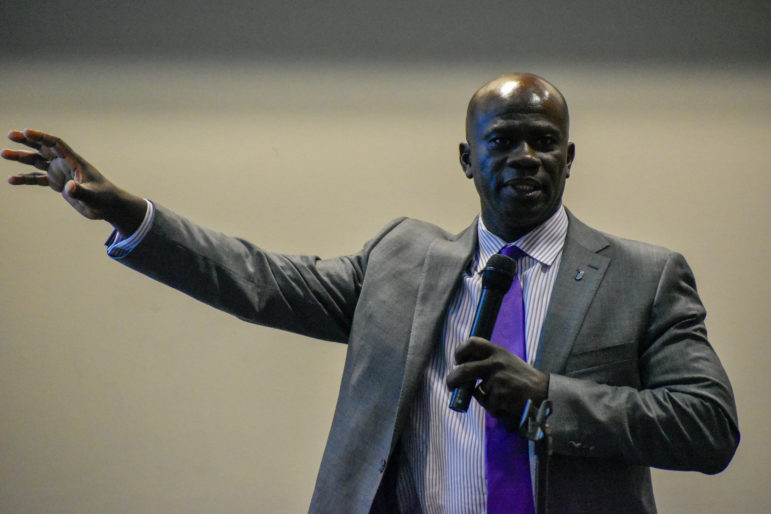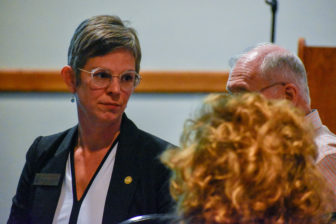
Andrew Roth
Michigan Department of Transportation Director Paul Ajegba speaks at a town hall hosted by Rep. Julie Brixie (D-Meridian Township) in East Lansing on Sept. 24, 2019.Michigan Department of Transportation Director Paul Ajegba said at a recent forum that a gas tax even higher than Gov. Gretchen Whitmer’s ill-fated 45-cents-per-gallon fuel tax increase proposal may be needed to truly “fix the damn roads.”
“The problem is so deep now that if you really want to fix it, you’re talking almost 80 cents,” Ajegba said at a town hall hosted in East Lansing by state Rep. Julie Brixie (D-Meridian Township). “That’s the problem. We dug ourselves such a huge hole that if you really want to take care of the problem, you’re almost going to be talking close to 80-cents-a-gallon.”
However, Ajegba called an 80-cent fuel tax “not realistic.”
Brixie noted that other solutions to raise revenue could be paired with the governor’s proposal, or even used as a replacement for the gas tax hike.
Among the alternatives: moving to a graduated income tax system, where taxpayers at higher income levels would be taxed at higher rates.
Graduated income taxes are currently unconstitutional in Michigan and would require a constitutional amendment approved by voters.

Andrew Roth
Rep. Julie Brixie (D-Meridian Township) speaks at a town hall in East Lansing on Sept. 24, 2019.But Brixie said the system would be a “very, very sound, tandem solution to address the chronic underfunding that we have.”
Brixie, who is serving her first term in the state House, is one of the few legislators from either party who openly supports the governor’s proposal for a 45-cent gas tax hike. She says this is where the gas tax should be today when accounting for inflation.
“If the framers of this funding formula had thought about it, and if they had pinned — indexed — the gas tax to inflation, guess what would’ve happened,” Brixie said. “The Republican leaders are really focused on their talking points, which is that one of the things that they’re doing is saying, ‘oh, well, we’re spending a record amount of money.’ Well, yeah, but you’re not even keeping up with inflation, so it kind of doesn’t matter. If you spend a record amount of money that’s less than inflation every year for 20 years, you’re still really far behind.”
The Michigan House and Senate passed their budget Sept. 24.
“These budgets are a mess,” Whitmer said in a statement that day. “This backwards plan to cut funding from our departments to pay for roads is exactly how we got in this mess in the first place, and it won’t do a damn thing to actually solve the problem.”
Whitmer signed the budget on Sept. 30, just hours before the Oct. 1 deadline to avoid a state government shutdown, but used her line-item veto power on the budget 147 times, axing nearly $1 billion, including $375 million of one-time road funding.
Whitmer also employed a rare maneuver on Oct. 1, using the State Administrative Board to shift $625 million of the budget within the departments the funds were originally appropriated for.
Whitmer, Senate Majority Leader Mike Shirkey (R-Clark Lake) and House Speaker Lee Chatfield (R-Levering) announced in a statement in early September that they would table road funding negotiations until they had a budget in place, focusing on averting a potential government shutdown.
Two days later, Shirkey’s office released a statement saying the governor had walked away from budget negotiations over a disagreement with their plan to increase road funding by making cuts to other areas of the budget.
“Our sincere efforts to reach consensus on budget targets came to an abrupt end when my governor ended negotiations this afternoon,” Shirkey said. “We could not have predicted that our talks would break down over my governor wanting less money to fix the roads, but in the end, we could not accommodate her position.”
Whitmer hit back, criticizing the Legislature for taking a weeks-long summer vacation.
“Let’s be very clear – Republicans wasted two months by going on vacation this summer instead of staying in Lansing to negotiate,” Whitmer said. “That’s the only reason we don’t have a budget right now. After months of inaction, the best plan they could come up with would steal money from other priorities and doesn’t fix the roads.”
Brixie touched on the issue at her town hall, noting that Republican leaders never put forward the road funding plan they had said was coming.
“We’re still waiting for that plan to fix the roads. The negotiations weren’t occurring over the summer. We kept hearing that the plan was coming,” Brixie said. “They weren’t meeting because they were working on a plan, but then we never got a plan. They never presented a plan.”
Ultimately, Ajegba said that his biggest fear as director of the Michigan Department of Transportation is somebody getting hurt as a result of disinvestment in infrastructure.
“I can give myriads of examples of really, really bad bridges out there that we just propped them up with a lot of temporary supports,” Ajegba said. “If we don’t invest, we risk region overpasses collapse. Somebody asked me, as the MDOT director, what keeps you up at night. This is what keeps me up. I would hate to get that phone call. I hope we never get to that.”